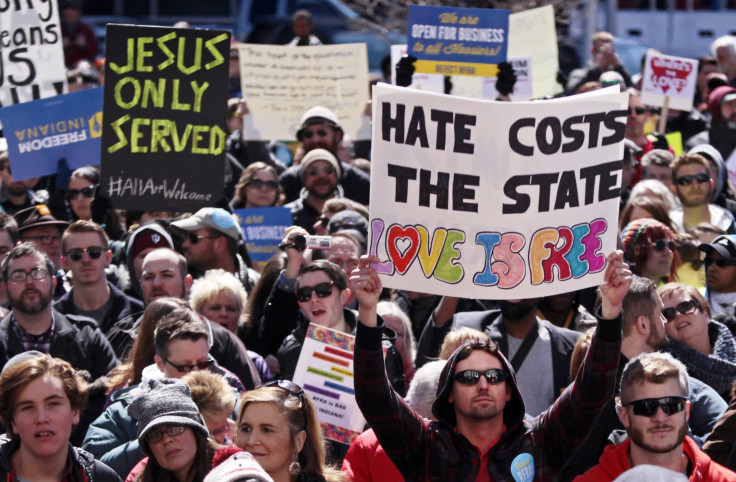Religious Freedom Restoration Act In Indiana: How State ‘Anti-Gay’ Law Is Different From Others'

Proponents of Indiana’s new religious freedom law have defended the controversial legislation by pointing out that other states have already passed similar regulations, implying that there’s essentially nothing new about Indiana’s Senate Bill 101. However, two features of Indiana’s law, which was signed Thursday by Republican Gov. Mike Pence and has been widely criticized as discriminatory against gays and lesbians, set it apart by further protecting corporations wanting to deny services to people based on sexual orientation.
Nineteen other states have statutes that echo language contained in the federal religious freedom law, which is meant to protect the free expression of religion in the U.S. by barring governments from “substantially burdening” individuals’ spiritual beliefs. But “calling [the laws] similar in this way risks being misleading,” Adam Talbot, a spokesman for the Human Rights Campaign, an advocacy group for gay rights based in Washington, told CNN. “Indiana is the broadest and most dangerous law of its kind in the country.”
For one, other states’ religious freedom laws apply to disputes between individuals and the government, whereas Indiana’s Religious Freedom Restoration Act applies to disputes between private residents. The law allows individuals, including business owners, to use religion as a defense in denying their services to certain groups of people “regardless of whether the state or any other governmental entity is a party to the proceeding.” Such language is absent from the federal religious freedom law as well as from the laws of 18 of the other 19 states with such statutes, the National Conference of State Legislatures said.
Secondly, the wording in Indiana’s law would give private businesses “the free exercise of religion” and allow them to claim religious beliefs in turning away people based on their sexual orientation. Such language equates for-profit businesses with individuals or churches and clearly gives businesses a means to defend themselves against private discrimination lawsuits, as opposed to simply defending against actions brought by the government.
Lawmakers, gay rights activists and businesses across the nation have criticized Indiana’s law as discriminatory. “I find Indiana’s new law disturbing, particularly at a time when more and more states and people in America are embracing civil rights for everyone," Washington state's Democratic Gov. Jay Inslee said in a statement. Inslee banned state administrators from spending state money to travel to Indiana following that law’s passage.
Most states with religious freedom laws modeled theirs after the federal Religious Freedom Restoration Act, which President Bill Clinton signed into law in 1993. The law was intended to protect religious minorities but has increasingly been adopted by conservative Christian groups to claim that serving gay couples violates their personal beliefs, especially as more states move toward legalizing same-sex marriage. There is currently no federal law banning private businesses from denying their services to lesbian, gay, bisexual or transgender people, although 21 states have passed legislation prohibiting discrimination based on sexual orientation.
Indiana does not have a statewide nondiscrimination law, although several cities have adopted local nondiscrimination statutes.
© Copyright IBTimes 2024. All rights reserved.






















